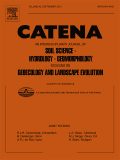
CATENA
Scope & Guideline
Uncovering Groundbreaking Insights in Geosciences
Introduction
Aims and Scopes
- Soil Erosion and Conservation:
Research on the mechanisms, rates, and impacts of soil erosion, including the effectiveness of various conservation practices to mitigate soil loss. - Soil-Plant Interactions:
Studies examining how vegetation influences soil properties, stability, and nutrient cycling, particularly in relation to land use changes and restoration efforts. - Hydrological Processes:
Investigations into the interactions between soil properties, water movement, and hydrological responses to rainfall, including modeling and field studies. - Soil Carbon Dynamics:
Research on soil organic carbon storage, turnover, and the effects of various agricultural practices on carbon sequestration and greenhouse gas emissions. - Climate Change Impacts:
Studies evaluating the effects of climate variability and change on soil health, erosion processes, and agricultural productivity. - Geomorphology and Land Use Change:
Research on how landforms and geological factors influence soil formation, erosion, and sediment transport, particularly in the context of human activities. - Soil Quality Assessment:
Development of indicators and methodologies for assessing soil quality, health, and functionality in various ecosystems.
Trending and Emerging
- Climate Change Adaptation:
Research on how soils and ecosystems can adapt to changing climatic conditions, including studies on resilience, restoration, and sustainable management practices. - Soil Microbial Ecology:
A significant increase in studies focusing on soil microbial communities, their diversity, functional roles, and responses to environmental changes, highlighting their importance in soil health and nutrient cycling. - Use of Advanced Technologies:
The application of remote sensing, machine learning, and geospatial analysis in soil studies is on the rise, facilitating improved mapping, monitoring, and predictive modeling of soil properties and erosion. - Ecosystem Services Valuation:
Growing emphasis on assessing and valuing ecosystem services provided by soils, particularly in the context of land use changes and environmental sustainability. - Integrated Land Management Practices:
Research exploring integrated approaches to land management that combine agricultural practices with ecological considerations to enhance soil health and productivity. - Restoration Ecology:
An increase in studies focused on the restoration of degraded landscapes, particularly in arid and semi-arid regions, emphasizing the role of soil health in ecosystem recovery.
Declining or Waning
- Traditional Soil Classification:
Research on conventional soil classification systems has waned as newer, more dynamic approaches to soil mapping and classification are developed, focusing on functional and ecological aspects rather than static categorizations. - Single-Factor Studies:
There has been a noticeable decline in studies that focus on isolated soil properties without considering broader ecological interactions, as interdisciplinary approaches gain prominence. - Historical Soil Studies:
Research solely focused on historical soil conditions and classifications is decreasing, with a shift towards understanding contemporary impacts and future projections in soil science. - Localized Case Studies:
The trend has moved away from isolated, localized studies towards broader, multi-site comparative analyses that provide more generalizable results.
Similar Journals

Soil
Championing Open Access to Soil KnowledgeSoil is a pioneering peer-reviewed journal dedicated to advancing the field of soil science, published by COPERNICUS GESELLSCHAFT MBH. Since its inception in 2015, this open-access journal has rapidly gained recognition for its high-quality research, evident in its prestigious Q1 ranking within the field and a solid position of 15 out of 159 in the Scopus rankings for Agricultural and Biological Sciences. Covering diverse aspects of soil science, including soil health, ecology, and management, Soil serves as a vital resource for researchers, professionals, and students alike, facilitating a deeper understanding of soil's critical role in the environment and agricultural productivity. With the scholarly content available freely, the journal aims to foster global collaboration and innovation in soil research, strengthening its impact in both academic and practical applications. Embrace the opportunity to contribute and engage with cutting-edge findings by submitting your work or reading the latest research in Soil.
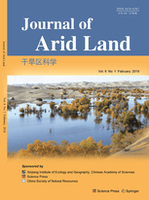
Journal of Arid Land
Pioneering insights for a sustainable tomorrow in arid landscapes.Journal of Arid Land, published by SPRINGER HEIDELBERG, is a pivotal platform dedicated to advancing knowledge in the fields of Earth-Surface Processes, Management, Monitoring, Policy and Law, and Water Science and Technology. With an ISSN of 1674-6767 and an E-ISSN of 2194-7783, this journal stands out as a prominent source of scholarly research focusing on the unique challenges and opportunities of arid and semi-arid environments, particularly relevant in the context of global climate change. As of 2023, it holds a commendable Q2 ranking in several critical categories, underscoring its impact in environmental science and related disciplines. The journal, which has been in publication since 2009 and is set to continue through 2024, provides unrestricted access to high-quality research that sheds light on sustainable practices and effective policies. With its focus on arid lands, the Journal of Arid Land plays an essential role in fostering interdisciplinary dialogue among researchers, practitioners, and policymakers striving to address the pressing issues faced by these ecosystems.
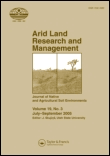
ARID LAND RESEARCH AND MANAGEMENT
Empowering sustainable solutions for arid ecosystems.ARID LAND RESEARCH AND MANAGEMENT is a leading journal in the field of Soil Science, published by Taylor & Francis Inc in the United Kingdom. With a focus on the sustainable management of arid and semi-arid lands, this journal aims to bridge the gap between scientific research and practical application. It garners a respectable impact factor, categorically positioned in the Q2 quartile within its field and ranks 59th out of 159 in Scopus, representing the top 63rd percentile of journals in Agricultural and Biological Sciences - Soil Science. As an essential resource for researchers, practitioners, and students alike, ARID LAND RESEARCH AND MANAGEMENT publishes high-quality, peer-reviewed articles that cover a wide range of topics, from soil conservation techniques to innovative land management practices. Open access options are available, facilitating broader dissemination of knowledge critical to addressing global challenges associated with arid environments. Targeting a pivotal area of study, this journal plays a significant role in advancing the understanding and management of these unique ecosystems, making it a valuable asset for anyone engaged in environmental sustainability.
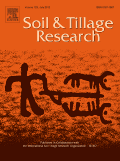
SOIL & TILLAGE RESEARCH
Exploring Innovations in Soil ManagementSOIL & TILLAGE RESEARCH is a premier international journal dedicated to advancing the understanding of soil science and tillage practices through high-quality research and insightful reviews. Published by Elsevier and based in the Netherlands, this esteemed journal boasts impressive impact metrics, being ranked in the Q1 category across multiple domains including Agronomy and Crop Science, Earth-Surface Processes, and Soil Science, reflecting its pivotal role in the academic community. With an H-Index that underscores its citation impact and a Scopus ranking placing it in the top percentiles of its field, SOIL & TILLAGE RESEARCH serves as a vital resource for researchers and professionals focusing on sustainable agricultural practices, soil management, and environmental conservation. This journal provides a platform for open dialogue and dissemination of knowledge that shapes future research directions and policy-making in land use and sustainable agriculture.

Spanish Journal of Soil Science
Unlocking the Secrets Beneath Our FeetThe Spanish Journal of Soil Science is a prestigious open-access journal published by FRONTIERS MEDIA SA since 2011. Based in Switzerland, this journal serves as a vital platform for disseminating innovative research and applications within the field of soil science. With its commitment to accessibility, the journal enables researchers, professionals, and students from around the globe to contribute to and benefit from its wealth of knowledge. As of 2023, it holds a respectable Q3 category ranking in soil science and is positioned at #88 out of 159 in the Scopus rankings for Agricultural and Biological Sciences. The journal aspires to foster collaboration and communication among soil scientists, encouraging the exploration of contemporary soil issues, sustainable practices, and advancements in technology. Its open-access model ensures that the latest findings are freely available, promoting a broader impact in environmental and ecological studies.

EURASIAN SOIL SCIENCE
Innovating solutions for soil conservation and management.EURASIAN SOIL SCIENCE, published by PLEIADES PUBLISHING INC, is a premier journal dedicated to advancing knowledge in the fields of soil science and earth-surface processes. With an ISSN of 1064-2293 and an E-ISSN of 1556-195X, this journal has been a key resource for researchers and professionals from its inception in 1992 and continues to thrive as it converges toward 2024. Situated in the United States, EURASIAN SOIL SCIENCE has achieved notable recognition, attaining a Q2 ranking in both Earth-Surface Processes and Soil Science categories as of 2023. Its Scopus rankings further underscore its importance, with Earth and Planetary Sciences placing it at #81/179 and Agricultural and Biological Sciences ranking it at #80/159. Engaging a global audience, this journal publishes cutting-edge research articles, reviews, and case studies that address critical issues related to soil health, conservation, and management. Though currently not open access, the journal offers valuable insights and fosters collaboration among scientists and practitioners, underscoring its vital role in enhancing the understanding of soil dynamics and sustainability.
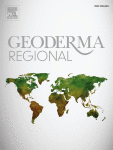
Geoderma Regional
Connecting research and practice in soil science.Geoderma Regional is a premier scholarly journal dedicated to advancing the field of Soil Science. Published by Elsevier in the Netherlands, this journal serves as a vital platform for disseminating high-quality, peer-reviewed research that spans the complexities of soil management, behavior, and the implications of soil processes on environmental sustainability. Since its inception in 2014, Geoderma Regional has achieved an impressive position within the academic community, holding a Q1 ranking in the field of Soil Science, placing it among the top 20% of journals in its category according to SCOPUS rankings. This journal is particularly distinguished for its significant contributions to the nexus between agriculture and biological sciences, reflected in its rank of #33 out of 159 in this field with a commendable 79th percentile. Researchers, professionals, and students alike will appreciate the journal's commitment to open discourse and innovative research agendas as it aspires to enhance our understanding of soil dynamics, addressing critical issues facing our planet.
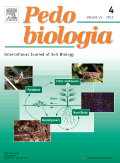
PEDOBIOLOGIA
Illuminating the Biological Functions of Soil EcosystemsPEDOBIOLOGIA, published by Elsevier GmbH, is a prestigious journal dedicated to advancing the fields of Ecology and Soil Science. Renowned for its authoritative contributions to understanding soil biology and its ecological implications, PEDOBIOLOGIA has maintained a strong impact within the academic community, evidenced by its Q2 ranking in both Ecology, Evolution, Behavior and Systematics and Soil Science categories in 2023. The journal has a broad scope that encompasses fundamental and applied research on the interactions between soil organisms and their environment. Since its inception in 1977, it has provided vital insights into the biological functions of soil, serving as a crucial resource for researchers, professionals, and students alike. Although not an Open Access journal, its publications are accessible through various academic libraries, ensuring that cutting-edge research continues to be available to a global audience. Located in the vibrant academic hub of Munich, Germany, PEDOBIOLOGIA not only emphasizes the importance of soil ecosystems but also fosters interdisciplinary dialogue, making it an essential platform for innovative studies in the field.

EGYPTIAN JOURNAL OF SOIL SCIENCE
Advancing Soil Science for Sustainable FuturesEGYPTIAN JOURNAL OF SOIL SCIENCE is a renowned publication dedicated to advancing the field of soil science, particularly within the context of Egypt and the broader regions of the Middle East and North Africa. Published by the NATIONAL INFORMATION DOCUMENTATION CENTER, ACADEMIC SCIENTIFIC RESEARCH & TECHNOLOGY, this journal aims to disseminate high-quality research and innovative practices related to soil management, conservation, and sustainable agricultural practices. With an emphasis on empirical studies, reviews, and methodologies relevant to soil health and productivity, this journal serves as an essential resource for researchers, professionals, and students alike. Although specific access options are not highlighted, the journal’s commitment to promoting scholarly discourse ensures that important findings within soil science are made available to wider audiences, contributing significantly to environmental science, agronomy, and ecological preservation.
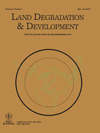
LAND DEGRADATION & DEVELOPMENT
Fostering interdisciplinary insights for sustainable land management.LAND DEGRADATION & DEVELOPMENT is a premier academic journal published by WILEY that has been at the forefront of research on the critical issues surrounding land degradation since its inception in 1989. With an impressive impact factor and ranked in the Q1 category across multiple fields including Development, Environmental Chemistry, Environmental Science, and Soil Science, this journal serves as an essential resource for scholars and professionals dedicated to sustainable land management and environmental conservation. Although it currently does not provide open access, its rigorous peer-review process ensures the publication of high-quality, impactful research that addresses vital environmental challenges. The journal aims to foster interdisciplinary collaboration, promote innovative solutions, and disseminate knowledge that not only informs policy but also empowers communities to combat land degradation effectively. Researchers, professionals, and students alike will find the insights and findings published in LAND DEGRADATION & DEVELOPMENT invaluable for advancing their understanding and practices within this critical field.